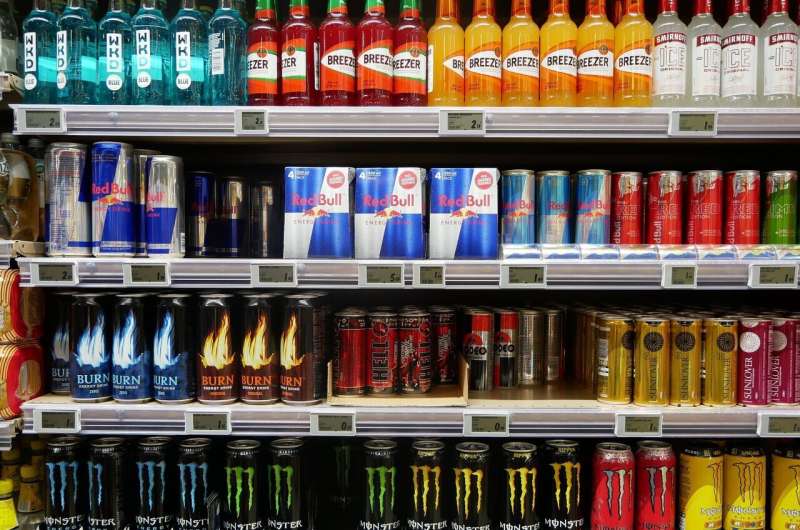
Credit: Pixabay/CC0 Public Domain
My husband has swapped out his regular morning coffee for an energy drink. Are these healthy options for getting his daily dose of caffeine? Do energy drinks have more caffeine than regular coffee? And how much caffeine is too much?
ANSWER: People love their caffeine, whether it’s coffee, tea, soda or energy drinks like your husband. It’s the most common stimulant in the world, and about 90% of all adults consume caffeine in some form every day. Many different caffeine options and flavors are readily available at coffee shops, restaurants, grocery stores and convenience stores. Energy drinks, in particular, are packaged in bright cans and have exciting names.
Caffeine is big business as well. The total global sale of energy drinks alone reached $57 billion in 2020. Energy drinks are the second-most popular dietary supplement among US teens and young adults behind multivitamins.
Caffeine’s health effects vary from person to person and depend on the dose. It’s been shown to improve vigilance, reaction time, alertness and ability to concentrate. It can help alleviate the adverse effects of sleep deprivation. Caffeine intake is also associated with a reduced risk of Parkinson’s disease, Alzheimer’s disease, alcoholic cirrhosis and gout.
However, caffeine intake is also linked with nervousness, insomnia, irritability and panic attacks. Those with pre-existing anxiety disorders may be more susceptible to these effects. Caffeine can temporarily raise blood pressure, and a high intake has been associated with a mild increase in cholesterol levels.
Check the amount of caffeine in your husband’s energy drink. Up to 400 milligrams of caffeine per day is considered safe for most adults. Most contain 100-300 milligrams of caffeine per serving, while home-brewed coffee contains 80-100 milligrams of caffeine per serving. Of course, these amounts can vary. If his preferred energy drink has 210 or more milligrams of caffeine per serving, consuming more than one per day would place his intake above the recommended level.
Excessive caffeine intake, more than 400 milligrams per day, can cause palpitations, tremors, agitation and gastrointestinal upset. Heavy caffeine use is also associated with an increased risk of other addictive behaviors, such as smoking and alcohol abuse. People who regularly consume caffeine may develop physical and psychological dependence, and they may experience withdrawal symptoms if intake is abruptly stopped.
Another ingredient to review in his energy drinks is sugar. Many can contain significant amounts of added sugar or other sweeteners. High intake of added sugar can contribute to a variety of health problems, so the Dietary Guidelines for Americans recommend limiting the intake of added sugars to no more than 10% of total daily calories.
If your husband follows a 2,000-calorie diet, no more than 200 calories per day should come from added sugars. This is about 12 teaspoons a day. One 16-ounce can of some energy drinks can contain as much as 210 calories and 47 grams of added sugar, which is roughly equal to 12 teaspoons. This is an entire day’s worth of added sugar.
Energy drinks aren’t all bad, though, especially when consumed in moderation. Some contain vitamins, minerals and amino acids. Others contain herbal supplements, such as ginseng and guarana, which can be used to increase energy and mental alertness. Use caution with these substances, as research on safety and effectiveness is limited. Also, some herbal supplements can interact with medications, so seek input from your husband’s health care team if he takes prescription medications.
It’s important to note that people who are pregnant or breastfeeding should limit their caffeine intake to 200 milligrams or less per day. The Food and Drug Administration has not set a safe level for children, but the American Academy of Pediatrics discourages the consumption of caffeine and other stimulants by children and adolescents.
©2023 Mayo Clinic News Network.
Distributed by Tribune Content Agency, LLC.
Citation: Q and A: Are energy drinks a healthy option? (2023, February 16) retrieved 22 February 2023 from https://medicalxpress.com/news/2023-02-energy-healthy-option.html
This document is subject to copyright. Apart from any fair dealing for the purpose of private study or research, no part may be reproduced without the written permission. The content is provided for information purposes only.

